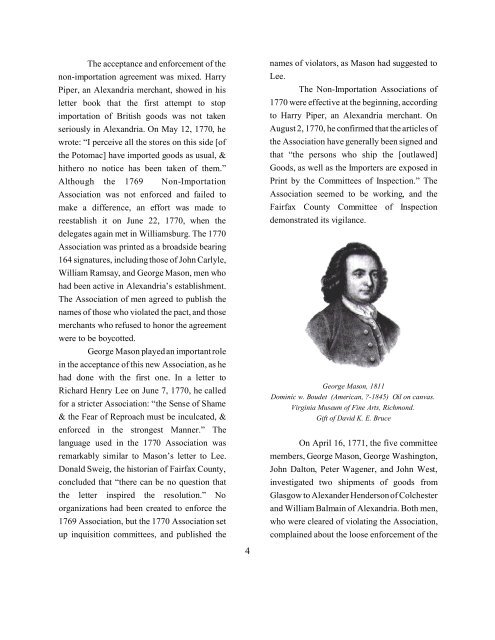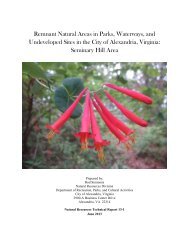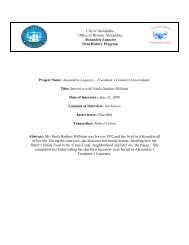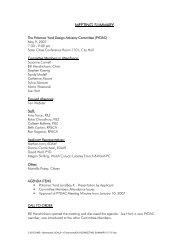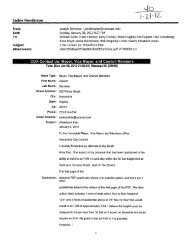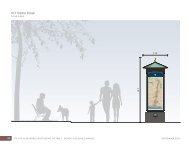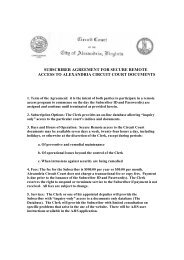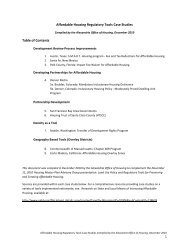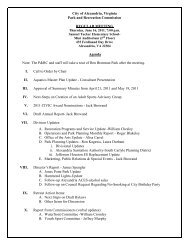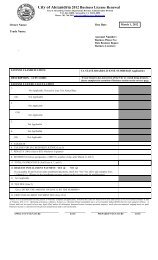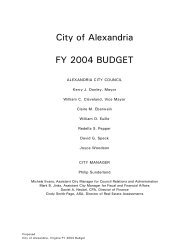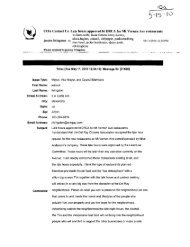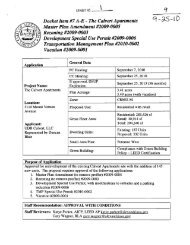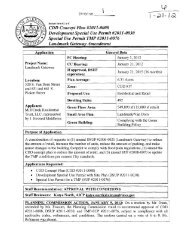LOYALISM IN EIGHTEENTH CENTURY ... - City of Alexandria
LOYALISM IN EIGHTEENTH CENTURY ... - City of Alexandria
LOYALISM IN EIGHTEENTH CENTURY ... - City of Alexandria
You also want an ePaper? Increase the reach of your titles
YUMPU automatically turns print PDFs into web optimized ePapers that Google loves.
The acceptance and enforcement <strong>of</strong> the<br />
non-importation agreement was mixed. Harry<br />
Piper, an <strong>Alexandria</strong> merchant, showed in his<br />
letter book that the first attempt to stop<br />
importation <strong>of</strong> British goods was not taken<br />
seriously in <strong>Alexandria</strong>. On May 12, 1770, he<br />
wrote: “I perceive all the stores on this side [<strong>of</strong><br />
the Potomac] have imported goods as usual, &<br />
hithero no notice has been taken <strong>of</strong> them.”<br />
Although the 1769 Non-Importation<br />
Association was not enforced and failed to<br />
make a difference, an effort was made to<br />
reestablish it on June 22, 1770, when the<br />
delegates again met in Williamsburg. The 1770<br />
Association was printed as a broadside bearing<br />
164 signatures, including those <strong>of</strong> John Carlyle,<br />
William Ramsay, and George Mason, men who<br />
had been active in <strong>Alexandria</strong>’s establishment.<br />
The Association <strong>of</strong> men agreed to publish the<br />
names <strong>of</strong> those who violated the pact, and those<br />
merchants who refused to honor the agreement<br />
were to be boycotted.<br />
George Mason played an important role<br />
in the acceptance <strong>of</strong> this new Association, as he<br />
had done with the first one. In a letter to<br />
Richard Henry Lee on June 7, 1770, he called<br />
for a stricter Association: “the Sense <strong>of</strong> Shame<br />
& the Fear <strong>of</strong> Reproach must be inculcated, &<br />
enforced in the strongest Manner.” The<br />
language used in the 1770 Association was<br />
remarkably similar to Mason’s letter to Lee.<br />
Donald Sweig, the historian <strong>of</strong> Fairfax County,<br />
concluded that “there can be no question that<br />
the letter inspired the resolution.” No<br />
organizations had been created to enforce the<br />
1769 Association, but the 1770 Association set<br />
up inquisition committees, and published the<br />
4<br />
names <strong>of</strong> violators, as Mason had suggested to<br />
Lee.<br />
The Non-Importation Associations <strong>of</strong><br />
1770 were effective at the beginning, according<br />
to Harry Piper, an <strong>Alexandria</strong> merchant. On<br />
August 2, 1770, he confirmed that the articles <strong>of</strong><br />
the Association have generally been signed and<br />
that “the persons who ship the [outlawed]<br />
Goods, as well as the Importers are exposed in<br />
Print by the Committees <strong>of</strong> Inspection.” The<br />
Association seemed to be working, and the<br />
Fairfax County Committee <strong>of</strong> Inspection<br />
demonstrated its vigilance.<br />
George Mason, 1811<br />
Dominic w. Boudet (American, ?-1845) Oil on canvas.<br />
Virginia Museum <strong>of</strong> Fine Arts, Richmond.<br />
Gift <strong>of</strong> David K. E. Bruce<br />
On April 16, 1771, the five committee<br />
members, George Mason, George Washington,<br />
John Dalton, Peter Wagener, and John West,<br />
investigated two shipments <strong>of</strong> goods from<br />
Glasgow to Alexander Henderson <strong>of</strong> Colchester<br />
and William Balmain <strong>of</strong> <strong>Alexandria</strong>. Both men,<br />
who were cleared <strong>of</strong> violating the Association,<br />
complained about the loose enforcement <strong>of</strong> the


